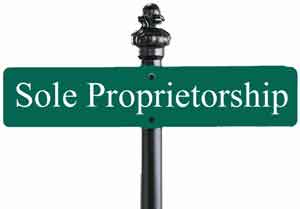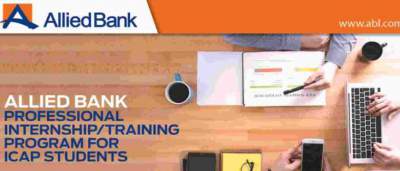Sole Proprietorship
Introduction of Sole Proprietorship
The individual proprietorship or sole proprietorship is the oldest form of business organization. It is as old as the civilization itself. Historically, it appears that business started first with this form of organization. It is the simplest and natural type of organization. Sole proprietorship is also called individual proprietorship, or one man business. Sole proprietorship is a form of business organization in which an individual introduces his own capita, uses his own skill and intelligence in the management of its affairs, assumes all the risks of business and is solely responsible for the results of its operations.

Definition of Sole Proprietorship
JAMES A. SHUBIN
“Under the sole proprietorship form of ownership a single individual organizes, has title to and operates the business in his own name.”
CHARLES S. TIPPETS
“The proprietorship is that form of business organization which is owned, managed and controlled by a single individual who receives all the profits and risks all his property in the success or failure of the enterprise.”
D.W.T.STAFFORD
“It is a simplest form of business which is owned and controlled by one man.”
PATERSON AND PLOWMAN
“A sole proprietorship is a business unit whose ownership and management are vested in one person. The individual assumes all risk of loss or failure of the enterprise and receives all profits from its successful operation.”
Example of Sole Trader ship
Following business are the general examples of sole proprietorship:
1. Retailer
2. Painters
3. Restaurant
4. Tourist guide
5. Barber
6. Beauty parlour
7. Doctor
8. Petrol pumps.
Advances/Merits of Sole Proprietorship
The following are the advantages of sole proprietorship:
- Easy formation:
It is very easy to form a sole proprietorship. No legal formalities like registration are required to start it. A lawful business can be started at any time. If a license is necessary to do any particular business, it may be obtained from the concerned department.
- Minimum legal restrictions:
There is no special law to govern the working of sole proprietorship. The government generally does not interfere in the activities of sole proprietor.
- Sole authority:
The sole proprietor has full authority to manage his business as he likes. He prepares the plan, invests his money, supervises the business and enjoys the profit. He is the king of his business.
- Sole claim on profit:
The sole trader receives full profits of the business. No one other than sole trader can claim the profits of the business. He also bears the full risks of loss.
- Freedom of action:
In matters of business dealing, the sole trader can take his own decisions. He is not bound to consult anybody. This type of freedom of action promotes initiative and self-reliance.
- Quick decision:
One-man business is best to take quick decisions. As there is no need to consult any other person, so the sole trader can take prompt decisions on all important issues. This enables a sole trader to avail business opportunities. This is not possible in a partnership or in a company where consultation is must to take any decision.
- Flexibility in operation:
A sole trading is more flexible than a partnership or a company in operation. There are no legal formalities for changing the nature of the business. The sole trader has absolute control over the affairs of his concern. Hi is able to introduce changes quickly to meet the needs of changing time and situations.
- Personal contact:
The sole trader has direct link with the customers. He is in a position to maintain personal contacts with his customers who are limited in number. He talks with the customers about his products and services. Thus he improves the quality of goods and services.
- Secrecy:
Secrecy is very important for the success of a small business. A sole trader is in a position to maintain secrecy. As there is no legal obligation to supply ant information regarding his business to any one, so he can maintain secrecy in all matters.
- Credit standing:
The sole trader has high credit standing among the creditors. The liability of the owner is unlimited. The creditors have the legal right to recover their claims from the business and the personal property of the owner. Due to this reason the creditors feel themselves secured in advancing credit to the sole trader.
- Management and control:
As the sole proprietor is the sole master of his business, so he has a full control over it. He is not accountable to anybody. Actually, the problem of coordination does not arise in this case the sole trader can make decisions any time in the interest of business.
- Incentive and satisfaction:
A sole trader gets the whole profit of a business. Due to this factor he works hard to make it successful. The risk of loss is lowest due to small size and direct link with customers. When the business is successful, the sole trader has a sense of satisfaction.
- Tax advantages:
The sole proprietorship enjoys tax advantages over the other forms. For he purpose of income tax no difference is made between the personal and business and income of the proprietor. The business income considered his personal income. He is taxes only, as an individual and not as a business unit.
- Easy dissolution:
The dissolution of sole proprietorship is very easy. The owner can sell his business to any person if he wants to do so. There is no complicated procedure for the dissolution of sole-trader ship.
- Self employment:
The sole trading business provides business careers to many persons of small resources. The sole trader becomes an earning hand for his family. Sometimes he creates employment opportunities for the unemployed youth.
- Inexpensive management:
The sole trader is the owner, manager and controller of the business. There is no nee dot employ qualified and experienced persons for supervision of business. He can personally look after all the affairs of his business. In this way, he can reduce the management cost. The minimum management expenses increase the profit.
- Development of personal qualities:
The unlimited liability of the sole trader is a source of strength to sole proprietorship. It develops many personal qualities in the sole trader. The qualities of initiative, self reliance and responsibility can be created insole trader.
- Benefit of good will:
The ownership of sole proprietorship business passes from generation to generation unless it is close. In sole proprietorship the son enjoys the benefits of good will made by his father.
- Relation with employees:
Since the size of business is usually small, the sole proprietor can maintains a close contact with his employees. This enables both the employer and the employees to understand the problems of each other.
- Reducing concentration of wealth:
There is large number of sole proprietorship business in Pakistan. It helps in reducing concentration of wealth in few hands. It may be one of the ways in which proper distribution of wealth is ensured.
- Benefit of inherited good will:
The ownership of sole trading business passes on from generation to generation. The sole trader ship, thus, enables the son to reap the benefits of good will of his father.
- Social benefits:
Sole proprietorship besides being useful to the individual owner, is also beneficial for the society, for instance.
- It makes an individual financially independent who becomes an asset and not a burden to the society.
- It develops social virtues like initiative, strong will; independent thinking and courage face odds in him.
Disadvantage/Demerits of Sole Proprietorship
There are certain serious disadvantages which a sole trader has to face in operating this form of business.
These disadvantages in brief, are as follows:
- Unlimited liability:
The liability of sole trader is unlimited. Not only his business property, but also his personal property is liable to pay his business debts. The creditors have the right to recover their amount of loan from the business and personal assets of the owner.
- Limited managerial ability:
The managerial ability of sole trader is limited. While running business many problems arise and it may not be possible for one person to solve them. Again, sole trader may not be an expert in performing every function like purchasing, selling, accounting and making correspondence. He may be expert in accounts but not in purchases.
- Limited capital:
In this form of organization only one person is responsible for the supply of capital. The trader provides capital from his personal sources. He cannot invest further after a certain limit.
- Limited expansion:
A successful business grows in size. But limited managerial ability and limited capital resources of sole trader do not allow the expansion of the sole trading business beyond a certain limit.
- Uncertain duration:
A sole trading business suffers from uncertain future. Any uncertain events happening in the personal life of the sole trader will disturb the smooth running of his business. The business comes to an end on the disability, insolvency or death of the sole trader.
- Chances of wrong decision:
The sole trader takes all the decisions. He is all in all. His decisions are based on individual judgment and skill. There is nobody to assist him in taking important decision that’s why his decisions can be wrong.
- Operational disadvantages:
The sole proprietor has to face operational problems which are not so severe in other forms of business ownerships. For instance, sole proprietors usually have inadequate buildings, substandard machinery, poor location, inability to purchase raw material in large quantity to avail of the discount, etc.
- Loss in absence:
A sole proprietorship has to suffer from the absence of proprietor. The business in his absence comes to a standstill.
- Absence of specialization:
The sole trader is not in a position to hire the services of experts like qualified accountants, salesmen etc. The sole trading business, therefore, is deprived of the services of experts.
- Weak bargaining position:
The sole trader both as buyer and seller has weak bargaining position compared to big business bunts.
- Unsuitable for a developing business:
When a business grows in size, this form of organization cannot meet the needs of expanding business.
- Lack of public confidence:
Public shows lass confidence on this type of business because there is no legal regulations to control and to wind up the business.
- Lack of skilled person:
One man can not hire the services of qualified and experienced persons because he has omitted sources. So he cannot achieve the maximum profit from his investment.
- Lack of inspection and audit:
In this form business there is no need of audit and inspection. Sometimes a business man is found illegal activities like black marketing and smuggling.
- Lack of advertisement:
In the present age advertisement plays very important role in increasing the profit of the business. But a single owner cannot bear expenses of advertisement.
Conclusion
The sole proprietorship form of business is the best form of business organization where a person has limited resources and wishes to work independently.



